The Harvard Family Research Project separated from the Harvard Graduate School of Education to become the Global Family Research Project as of January 1, 2017. It is no longer affiliated with Harvard University.
New Stories of Innovation in Family Engagement
February 2016
Within just a few weeks from the release of the Quilting Stories of Innovation in Family Engagement, we have received a number of stories that reflect the work from multiple sectors on engaging families to improve the lives of children. A common thread tying the stories together in this innovations quilt is the idea that supporting family engagement is a shared responsibility of families, schools, and communities. These stories highlight a coordination of efforts and the establishment of partnerships. Through these partnerships, diverse sectors and stakeholders work together and optimize their resources to support children’s learning and development anywhere, anytime.
The stories below are examples of how the field is helping parents become literacy leaders and take on new roles as partners within their communities. The innovations also illustrate how future educators are developing the necessary awareness and skills to work effectively with families. In many instances, digital technology plays a central role in making these initiatives possible.
Digital Innovators | Course Innovators | Lifelong Learning Innovators
Digital Innovators: How Technology Is Facilitating Family Engagement in New Ways
Parentopia creates a blended learning environment for families of young children.
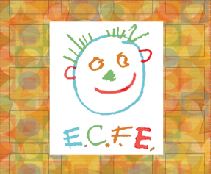 What is your family engagement story, idea, or practice?
What is your family engagement story, idea, or practice?
With an ECFE (Early Childhood Family Education) site in St. Paul, Minnesota, we have developed the first blended learning environment for parents and families of young children through the creation of Parentopia. ECFE offers families once-a-week parent education, early education, and parent‒child interaction with licensed early childhood teachers and parent educators. The program begins at birth and continues through age five. It is open to all families (universal access), and engages with families who live in the neighborhood. Through the use of Parentopia, teachers have a virtual space for engagement with all families in classes and across the program through integrating communication, collaboration, and content-sharing tools for learning. Parents are able to continue learning about parenting through discussions with teachers and with the parents who are part of their trusted learning communities. The ability to include family members who can’t attend the face-to-face classes allows information for learning and engagement to be extended and shared and for all family members to feel involved. The virtual platform then offers opportunities for individual enhanced learning and engagement with the program and with teachers―for social engagement, support, and the building of social capital with a community of peers―and for a wider community of families and staff to be built through blended offline and online interactions. We are currently implementing the platform that was designed through a program‒university partnership and observing the context factors required for full, organic use of hybrid learning in a community-based nonformal education program (e.g., staff technology comfort and competency, support for content and platform updates, value of instructor presence in parent use, and administrative support).
What makes your story, idea, or practice innovative?
To our knowledge, this is the first attempt to offer a blended engagement and learning experience to families in an early childhood parenting experience. We have the opportunity to study this kind of engagement and its impacts on parenting and parent well-being and indirectly on children’s outcomes because of the continuous, universal access, community-based, and school district‒sponsored nature of the ECFE program. Unlike other programs that may be short term, ECFE builds relationships with families that continue actively for up to five years, and for many families for their whole lives. And because ECFE is a product of the schools (and many families stay within the school district for primary and secondary school choices), and since much of engagement is based on trust and familiarity, the blended learning and engagement experience (we believe) has the potential to strengthen early relationships between parents and school staff and the school district that can be a “head start” to the family‒school engagement efforts down the road.
Course Innovators: How Faculty Are Helping Future Educators Acquire Skills to Partner with Families
College and community partner to train future educators in family engagement.
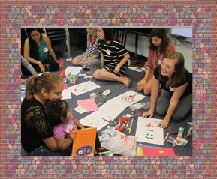 What is your family engagement story, idea, or practice?
What is your family engagement story, idea, or practice?
As a teacher educator at the College of Charleston, I want to provide hands-on experiences for students to work with culturally and linguistically diverse families. For the past two semesters, I have partnered with a family literacy program called Abrazos for mothers who are low-income Hispanic immigrants. Abrazos is federally funded but coordinated by the Charleston County School district in Charleston, South Carolina. During this community-based learning experience, we learn about working with families who are immigrants and English language learners. But most importantly, we have fun interacting with the mothers and their children by creating family portraits using art object and family stories. Through these low-stress art and literacy activities, the mothers get an opportunity to practice their English with native speakers while my teacher candidates have the chance to learn from the mothers about their families and their hopes and dreams for their children.
What makes your story, idea, or practice innovative?
This practice is innovative because I focus on providing opportunities to teacher candidates about how to engage culturally and linguistically diverse families in meaningful ways within a community-based program. Too often, teachers do not receive opportunities to work with families until they have their own classrooms. As a result, stereotypes and assumptions about families remain unchecked. Before, during, and after this learning experience, teacher candidates are required to participate in structured written reflections in which they are challenged to consider their assumptions. Teacher candidates also have the opportunity to create family literacy bags that are culturally relevant based on what they learned about the families, which results in their having to immerse themselves in good children’s literature and apply what they are learning about developmental appropriateness as they create learning activities for the families.
Lifelong Learning Innovators: How Families Learn New Skills for Parenting, Civic Engagement, and Leadership
Family Service Learning provides civic engagement opportunities for parents.
W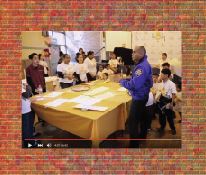 hat makes your story, idea, or practice innovative?
hat makes your story, idea, or practice innovative?
The National Center for Families Learning knows that when families solve community issues together, they are simultaneously learning and applying critical 21st-century college and career readiness skills. The latest iteration of Parent and Child Together (PACT) Time® Family Service Learning offers a powerful opportunity for families to learn together while forming deep partnerships within their community. As with all effective PACT Time experiences, the value that parents place on civic engagement and community relationships within the community will likely transfer to the child and create a sense of responsibility, empathy, and caring for others. The service leads to deeper community assimilation and shared learning experiences that transfer into tangible educational and employability skills.
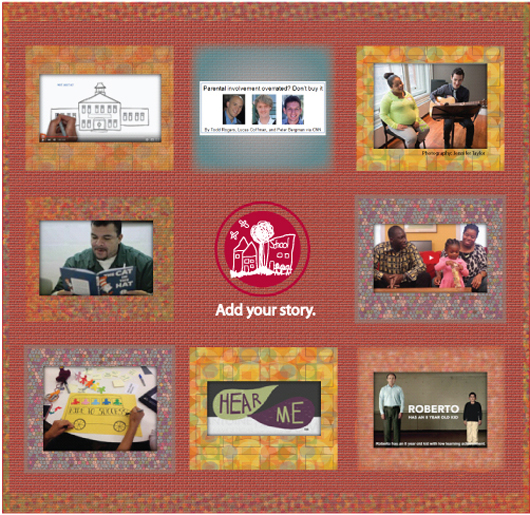
Visit Quilting Stories of Innovation in Family Engagement
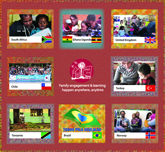
Visit Innovative Stories of Family Engagement From Around the World!
